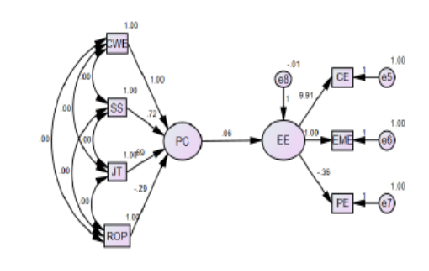


Indian Journal of Science and Technology
Year: 2023, Volume: 16, Issue: 6, Pages: 385-390
Original Article
M B Kavyashree1, Sridevi Kulenur2*
1Assistant Professor and Research Scholar, JSSCMS, JSS Science and Technology University, Mysuru, Karnataka. Fax: India
2Professor, JSSCMS, JSS Science and Technology University, Mysuru, Karnataka. Fax: India
*Corresponding Author
Email: [email protected]
Received Date:02 January 2023, Accepted Date:27 January 2023, Published Date:11 February 2023
Objectives: To determine the relationship between drivers of psychological climate and employee engagement considering the workforce who are a part of IT industries in Mysuru and Bengaluru region in India. Methodology: A cross-sectional survey method was adopted for obtaining the required data. Exploratory Factor Analysis, Confirmatory Factor Analysis, Structural Equation Modelling were adopted for examining and analyzing the data. Data was elicited through 445 respondents having their career in various IT industries in Mysuru and Bengaluru region between May 2022 to September 2022. Findings: Structural Equation Modelling analysis reveals that, the fit indices values were admissible. The model fit indices values that were recorded are: Chi- Square Statistics (CMIN/DF) = 2.845; Goodness of Fit index (GFI) = 0.982; Adjusted Goodness of Fit Index (AGFI) = 0.937; Incremental Fit Index (IFI) = 0.963; Tucker – Lewis’s Index (TLI) = 0.900; Comparative Fit Index (CFI) = 0.962; Root Mean Square Error of Approximation (RMSEA) = 0.073. The prominent drivers of Psychological Climate were identified as - Cooperative Work Environment (CWE); Supervisor Facilitation and Support (SS); Job Training and Support (JT) and Organizational Regulations (ROP). The identified factors resulted to have a relationship with Employee Engagement. Novelty: The important drivers of Psychological Climate essential at workplace were identified. The research outcome provides insight for the business managers to significantly focus on the psychological climate factors perceived by employees and build a better working environment.
Keywords: Psychological Climate; Employee Engagement; Business Enterprises; Workforce; Structural Equation Modelling
© 2023 Kavyashree & Kulenur. This is an open-access article distributed under the terms of the Creative Commons Attribution License, which permits unrestricted use, distribution, and reproduction in any medium, provided the original author and source are credited. Published By Indian Society for Education and Environment (iSee)
Subscribe now for latest articles and news.